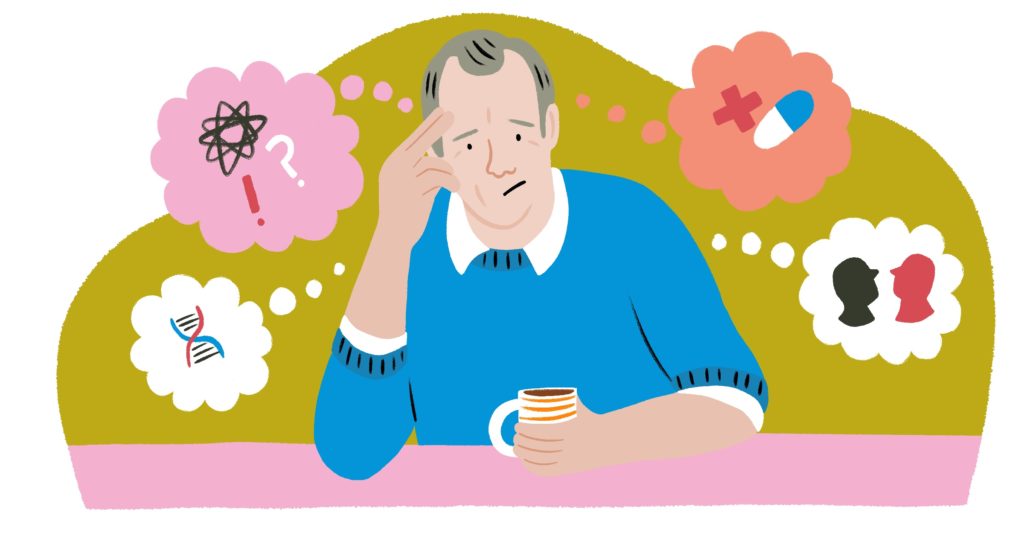
By Sophia Auld
Statistics seem to show ADHD rates are higher among men — though many experts believe girls and women with ADHD are underdiagnosed. But less is known about whether men and women live with ADHD in the same way. How men experience and perceive ADHD symptoms can impact how they respond to them, and may make it more difficult for them to seek diagnosis and treatment.
Differing perceptions of ADHD symptoms
People sometimes view ADHD symptoms differently in men and women. “Men might have even been rewarded for the traits that come with ADHD, such as someone at home cleaning up or doing their laundry because they can’t seem to get to it,” says Sanam Hafeez, a New York state licensed psychologist and director of Comprehend the Mind. “Fast talking and interrupting, taking up airspace, can also be rewarded when men do it, whereas women can be perceived as pushy or aggressive.”
Daniel Wysocki, Ed.S., a therapist and psychological examiner who focuses on diagnosing and treating ADHD, agrees adolescent impulsivity and lack of self-control may be rewarded in males, or viewed as a normal phase of development. “It’s something they used to take pride in, or others would celebrate,” he says.
Symptoms and responses to them
Men may also experience and react differently to ADHD symptoms. Wysocki says many men can compensate for their difficulties at work, but their daily routines outside of work are often most affected. Like Hafeez, Wysocki notes this can be most evident at home.
“Men with ADHD can quickly become overwhelmed by multi-step tasks, including laundry, cooking and other household chores,” he says. “Since there has traditionally been less emphasis on men caring for their homes, this is often an overlooked area of impairment. There is denial and shame about these being signs of dysfunction, due to the perceived division of men’s and women’s responsibilities.”
Hafeez says men may feel more defensive about their abilities. “Relationships are also impacted as many men feel ‘nagged’ about all the things they don’t get done,” she says.
Ryan Bolling, behavior analyst and CEO of Atlanta-based Bolling Behavioral Consulting, says many men are not diagnosed until adulthood because they’ve been able to mask their symptoms throughout childhood and adolescence. “This can lead to a lot of shame and denial when they finally realize they do have ADHD,” she says.
Furthermore, she says, men may be more likely to act out in impulsive ways or engage in risky behaviors. “This can obviously cause problems both for the individual and those around him,” she says.
Jeremy Schumacher, a licensed marriage and family therapist in Milwaukee, Wisc., says he often sees men with ADHD who are struggling to manage their emotional responses. He says he also often sees “men who have poor food habits, who are either overweight or way overcompensating with a fitness lifestyle.”
Barriers to getting assessed
Men may also experience different obstacles to getting an ADHD assessment, one of which is the stereotype that hyperactivity is a consistent ADHD symptom. This can lead to less awareness of other symptoms. “Many men don’t realize that emotional reactivity, sensory issues or poor eating habits can all be symptoms of underlying ADHD,” Schumacher says.
Men may also avoid getting assessed for ADHD because they don’t want to admit there might be something wrong, Bolling says. “This can be a major problem because untreated ADHD can lead to all sorts of issues at work, in relationships, and in other areas of life,” she says.
Hafeez says she has seen an uptick in both adult men and women seeking ADHD diagnosis and treatment in recent years. However, “in my personal clinical experience, I see more women seeking assessments after (they learn) women are underdiagnosed from articles or social media posts,” she says. “Men will usually seek an evaluation because of difficulties at work, or because a spouse or partner encourages it.”
Wysocki says the belief that ADHD is a child’s disorder, or a “boys will be boys attitude,” can deter men from getting evaluated. “Most people with ADHD are highly capable, intelligent and driven to success and can mask their difficulties,” he says. “At least until their symptoms are aggravated by their environment.”
Responses to diagnosis
Men can have a wide range of responses to receiving an ADHD diagnosis. Some may find it hard to discover symptoms that were rewarded or viewed as normal could have been early signs of a disorder, says Wysocki. “Not only are they suffering from these issues, but they are having to re-think who they are as a person,” he says. “Being correctly diagnosed with ADHD can be an emotional turning point. It is difficult to cope with learning they might have found a more successful life if they received early diagnosis and treatment.”
Schumacher says many men he works with are relieved to get a diagnosis — because they’ve struggled for so long. “Finally having an answer as to why it’s been so hard is a huge relief,” he says.
Reasons to seek help
Shame and denial can make it difficult for men to seek help for ADHD, Wysocki says. He suggests two ways to overcome these feelings: education and taking the first step towards getting evaluated. He notes ADHD is not a fictional disorder, but a well-studied, persistent problem within the functional systems of the brain.
“The consequences of untreated ADHD are severe,” he says. “If you continue to feel shame and guilt over a possible diagnosis, you can carry these feelings and still complete a comprehensive assessment. Every day we do things that make us uncomfortable or cause distress. Once you’ve completed the evaluation, you can make an informed decision about your treatment options. It is confidential and private.”
Schumacher agrees getting assessed is crucial, as is finding expert help. “Many professionals still think of ADHD as only hyperactivity or procrastination and miss many of the daily symptoms that give people with ADHD the most trouble,” he says.
“It can be so discouraging to try as hard as you can and not make any progress,” Schumacher says. “An expert can help men understand what works for their brain, and where their individual struggles around ADHD are based.”
And, Schumacher adds: “On a hopeful note, men who have managed their ADHD into adulthood have so many positive coping skills they’ve built up over time — often unknowingly. Being neurodiverse in a neurotypical society is tough, and the resilience and outside-the-box thinking men with ADHD have to tap into growing up are great strengths in continuing to manage ADHD for the rest of their lives.”
Sources:
CHADD: General Prevalence of ADHD
CDC: Data and Statistics About ADHD





